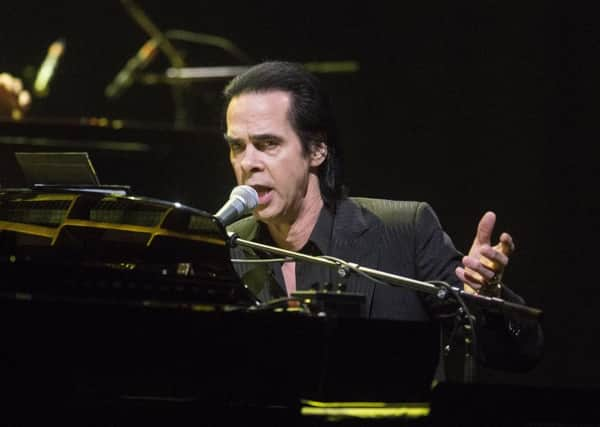Album reviews: Nick Cave | Wilco | Shakin' Stevens | The Eastern Swell


The accompanying documentary, Once More With Feeling, debuted the day before the album’s release, provided some painful yet dignified insight into this family tragedy, with Cave having no choice but to abandon his usual clever, crafted storytelling to channel straight from the gut.
POP
Nick Cave: Skeleton Tree ****
Bad Seed Ltd
Wilco: Schmilco ***
dBpm Records
Shakin’ Stevens: Echoes of Our Times ***
HEC
The Eastern Swell: One Day, A Flood ****
Stereogram Recordings
Having given the listener leave to behold his grief, he hits us with an opening line, “you fell from the sky and crash-landed in a field near the River Adur”, which is incredibly close to the bone. Skeleton Tree is explicit but never pornographic. In among the ripe expressions and impressionistic imagery, a line will jump out, but mostly it is a brooding album to feel in your bones. The fuzzy background hum and theremin whistle of Jesus Alone is eerily beautiful, as are the haunting, sighing backing vocals of the Bad Seeds, which resonate through the album like a doom-laden Greek chorus. Cave, meanwhile, sounds barely there yet omnipresent, the chest-beating testifier diminished but not beaten by grief.
Advertisement
Hide AdAdvertisement
Hide AdGirl In Amber is exquisitely mournful, I Need You, a beseeching, desolate prayer, while Magneto and Anthrocene are two of the most downbeat and understated pieces Cave has ever released, the demonstrative lyrics of the latter belying its insect flutter.
Danish soprano Else Torp adds purity and definition to the disorientating murk with her guest vocal on the valedictory Distant Sky but there is no closure, only catharsis on these weeping songs, with the title track fading out on the self-comforting mantra “and it’s all right now”.
Wilco’s new album Schmilco is a palate cleanser after such oppressive intimacy. Following the audacity and almost bewildering range of last year’s unexpected free album Star Wars, frontman Jeff Tweedy keeps things disarmingly simple on the likes of acoustic rock’n’roll number Cry All Day. The band plays it loose and low-slung, somewhat neutralising the effects of the doleful lyrics, but there are vestiges of eccentricity and experimentation throughout, such as lo-fi, off-kilter percussive jam Common Sense.
Shakin’ Stevens also goes back to his roots on his 12th album, setting aside the bubblegum nostalgia of his 80s hits to dig a bit deeper and reveal something of his own family history through this collection of original songs. Echoes of Our Times, inspired by an appearance on the BBC Wales genealogy show Coming Home, is a surprisingly earthy effort from a performer who has always seemed something of a pop cipher. But these blues, gospel and country-influenced songs suit his lived-in voice, as he sings of Cornish miners in Down in the Hole or gets stuck into the ZZ Top-style boogie Down Into Muddy Waters and the rattling rockabilly of Train of Time.
The Eastern Swell also plumb the past, at least sonically, on their debut album, One Day, A Flood, released on Edinburgh label Stereogram Recordings. This Anglo-Scottish group cook up a pleasing patchouli oil-scented blend of prog rock, pastoral folk and psych soul which is generally softer than their Glasgow-based peers Trembling Bells and more akin to the blissful, burnished reveries of Canterbury space cadets Syd Arthur.
FOLK
Barbara Dymock: Leaf an’ Thorn ***
Liftfire
Barbara Dymock was singer with the embryonic Ceolbeg, before pursuing a career in medicine and raising a family. Her second album in recent years sees her collaborating with multi-instrumentalist and producer Christopher Marra, with other contributors including Jenny Hanson on fiddle, accordionist Luke Brady and bassist Calum McKenzie.
These song settings, led by Marra’s considerate guitar accompaniments, largely do justice to Dymock’s warm and clear vocals. Violet Jacob’s The Heid Horseman, for instance, is articulated with measured feeling, slide guitar introducing an unexpected but effective element, while Dainty Dounby is ushered round the floor by an unabashed country dance band accompaniment.
Advertisement
Hide AdAdvertisement
Hide AdThe upbeat rendering of The Wife of Usher’s Well, catchy though it may be, steers the song between Childe balladry and Woodstock, eroding its essentially otherworldly nature. Dymock redeems things, however, with a poised, unaccompanied, rendition of Helen of Kirkconnel.
Jim Gilchrist
CLASSICAL
Stravinsky: Choral Works ****
Delphian
Stravinsky described the music of his 1940s Mass as “very cold music” that will “appeal directly to the spirit”. That clinical severity – a biting consequence of his brutalist breeze-block construction process – is a feature of much of Stravinsky’s music, but somehow takes on an icier austerity when applied to religious settings. The choir of St Mary’s Episcopal Cathedral, Edinburgh, with a ten-strong wind ensemble from the Scottish Chamber Orchestra under Duncan Ferguson, find much of that ritualistic primitivism in a performance super-sensitised by the cool innocence of the children’s voices. There’s a slight lack of edge to the choir’s textural and rhythmic articulation, but that’s a quibble in an otherwise steely performance. Warmer examples of Stravinsky follow in the calm reverence of the Ave Maria and Pater Noster settings, in the more opulently coloured Cantatas, and the time-travelling novelty of his reconstruction of Renaissance eccentric Gesualdo in the Tres Sacrae Cantiones.
Ken Walton